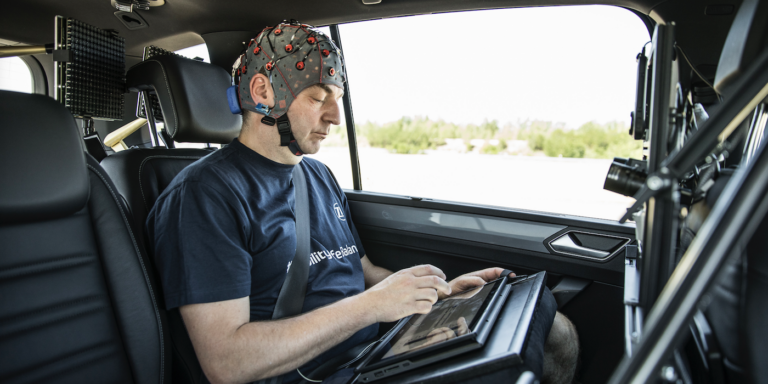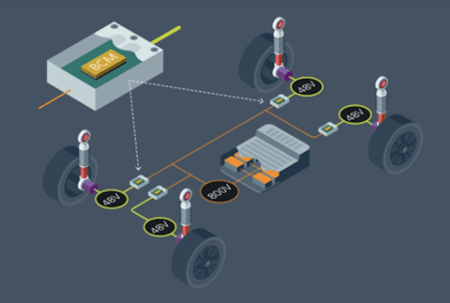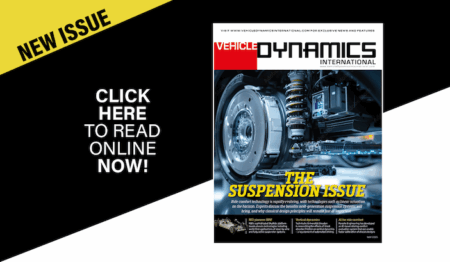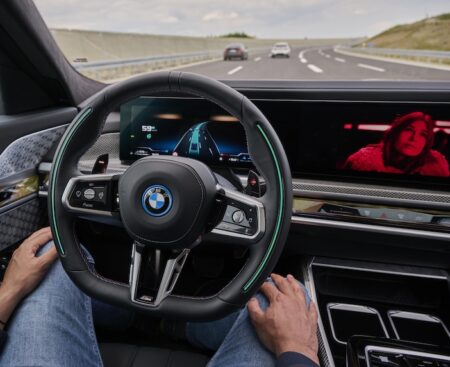Motion sickness in vehicles is a growing concern, increasingly caused by passengers viewing tablets and other devices while on the road – an issue that will only grow in importance as autonomous vehicle (AV) technology further develops, ultimately requiring less focus on monitoring the road ahead.
ZF is working with neuro-technologists from Germany’s Saarland region to investigate how to detect motion sickness at an early stage, with a view to developing smart driving features to detect the symptoms early in order to increase occupants’ comfort in next-generation mobility.
According to ZF, around a third of passengers suffer a sense of dizziness and motion sickness on long journeys, with small children particularly susceptible. To help solve this problem, ZF is looking beyond a purely vehicle-based approach.
“We are among the very first companies in this sector to place the occupants and their individual driving experience centre stage”, stated Florian Dauth, responsible for human-centred vehicle motion control at ZF’s Advanced Technology Development. “Our goal is to identify individual instances of motion sickness and to devise measures that relate to the prevailing condition of the passenger.”
The scientific basis for this concept is derived from test candidate studies that were conducted jointly by the Systems Neuroscience & Neurotechnology Unit (SNNU) at Saarland University in Germany and the University of Applied Sciences in Saarbrücken, Germany (htw saar). The researchers monitored the physiological reactions of test candidates in a variety of driving situations, applying expertise in the fields of neuro-technology, psycho-physiology, artificial intelligence and driving dynamics.
So what causes motion sickness?
Motion sickness is caused by a discrepancy in perception: when a passenger is concentrating on a screen or a book rather the road, the balance organ in the inner ear can sense a movement that is not confirmed by other sense organs such as the eyes. In this situation, the human body responds with a reaction that is in many ways similar to the physical response to poisoning, with symptoms ranging from a slight sense of unease to acute motion sickness.
The team created a ‘Motion Sickness Research Vehicle’, which enabled them – with the help of a high-performance computing platform – to record a large number of physiological and camera data, and measurements relating to driving dynamics. The vehicle also serves as a platform for the development and validation of algorithms.
Researchers at ZF and SNNU analysed the physiological markers that show the highest correlation with the subjective perception of motion sickness in individuals, such as temperature and galvanic skin response. They also examined how this sensation correlates to the driving dynamics of a vehicle.
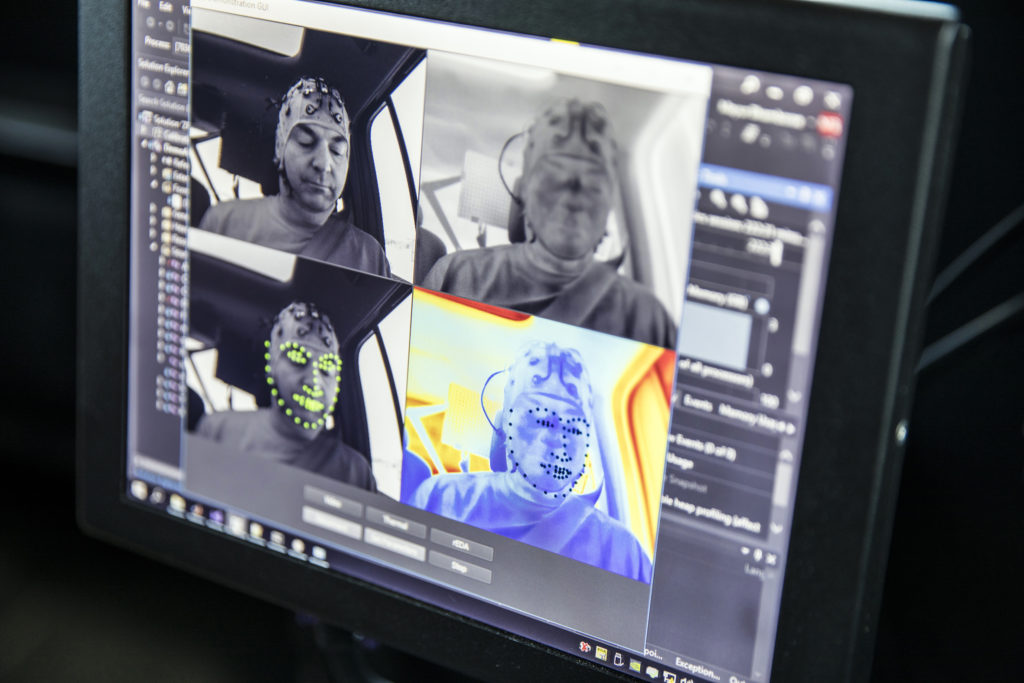
Over more than 10,000km (6,000 miles), the team of researchers gathered more than 50,000GB of physiological markers in the central and autonomous nervous system in the form of thermographics, imagery, and driving dynamic data. According to the team, this data represents a unique and multi-modal data resource on the subject of motion sickness.
“It helps us to apply a scientific procedure to the task of gaining an understanding of the phenomenon of motion sickness, and is at the same time a basis for depicting AI-based algorithms”, stated ZF’s Dauth.
The research currently employs a set of sensors inside the vehicle, paired with wearables for non-invasive measurement of test subjects. “The challenge is to develop an automotive-compatible system that, over a number of evolutionary steps, enables motion sickness to be detected without physical contact. We view this as crucial information to gain a firm grasp of the very individual phenomenon that is known as motion sickness”, explained Dauth.
The intended result is that drivers – or at some future point, the control systems running an automated vehicle – will be able to identify at an early stage if, for example, a child on the back seat is starting to feel ill so they can adapt their driving characteristics accordingly.
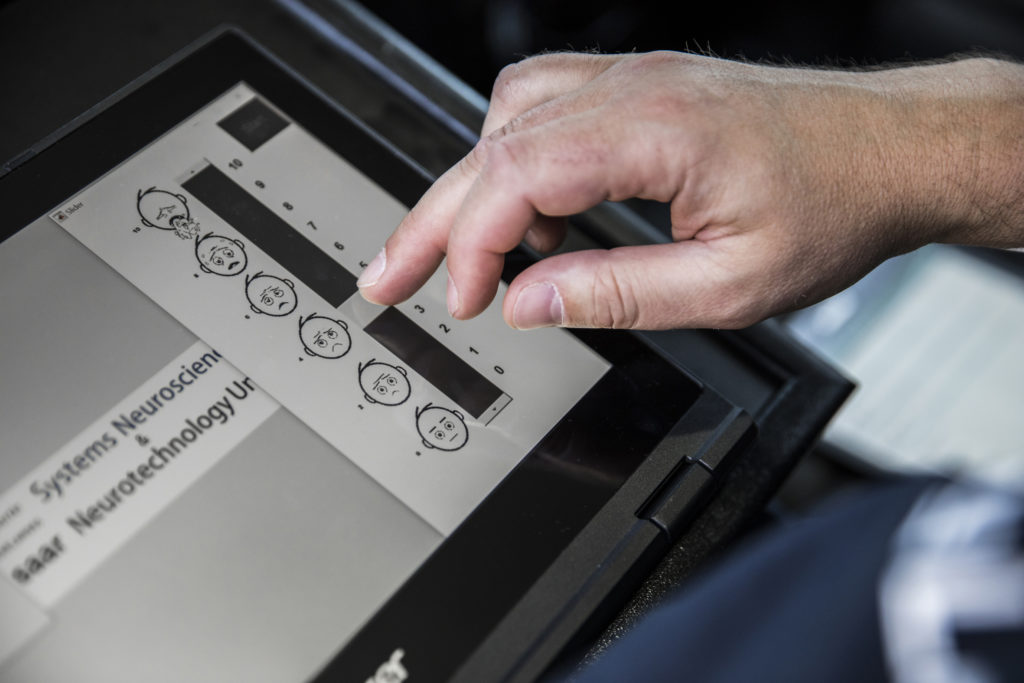
The vehicle learns a preventive driving style
The solution may not be a ‘one size fits all’ system, because everyone reacts differently to vehicle movements, and has an individual sense of ride comfort. Thus ZF is developing an algorithm based on ArtificiaI Intelligence methods that acquires knowledge of the physical reactions of each passenger, enabling a personalised profile to be created. Eventually individual data will be obtained for every passenger in a vehicle, meaning that automated vehicles would be able to store the preferred driving style of each passenger, proving customised and optimised comfort.


